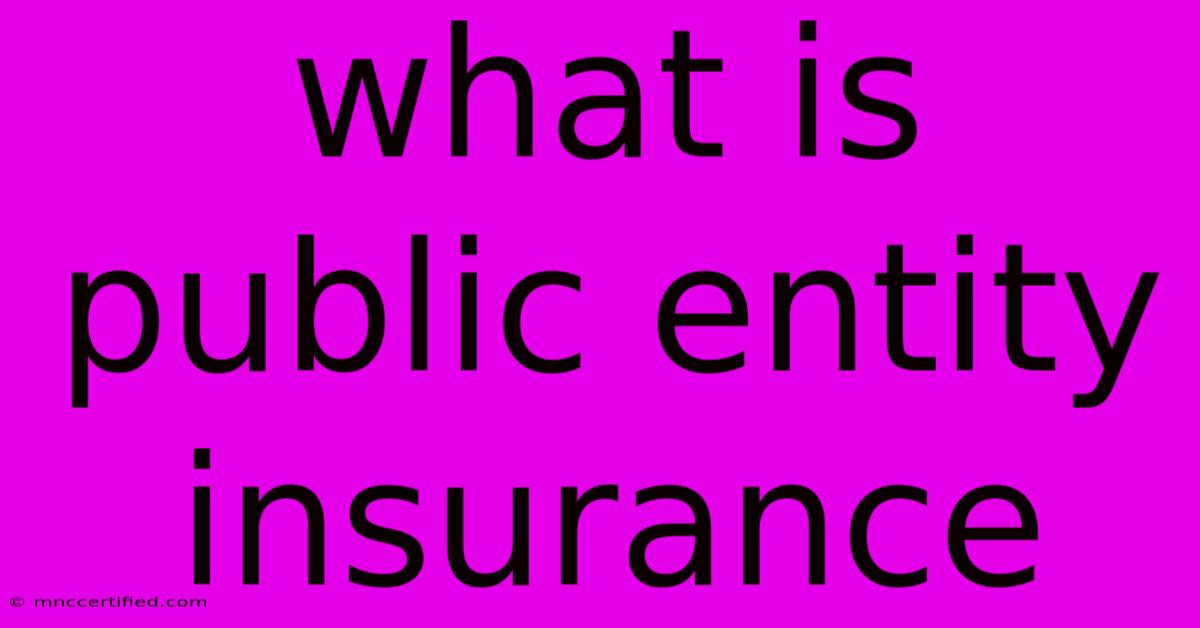What Is Public Entity Insurance

Table of Contents
What is Public Entity Insurance? A Comprehensive Guide
Public entity insurance is a specialized type of insurance coverage designed to protect government agencies, municipalities, school districts, and other public entities from various financial risks. Unlike traditional commercial insurance, it addresses the unique liabilities and exposures faced by organizations serving the public. Understanding this type of insurance is crucial for anyone involved in public administration or working with government bodies.
Understanding the Risks Faced by Public Entities
Public entities face a diverse range of risks, encompassing everything from property damage and liability claims to employee-related issues and cybersecurity breaches. These risks can translate into substantial financial losses if not adequately addressed. Some key areas of concern include:
1. Liability Claims:
- General Liability: This covers claims arising from bodily injury or property damage caused by the entity's operations or employees on public property. Think slips and falls, accidents at public events, or damage caused by public works projects.
- Professional Liability (Errors & Omissions): This protects against claims alleging negligence or professional misconduct by public officials or employees. This is particularly relevant for areas like education, law enforcement, and social services.
- Public Officials Liability: This crucial coverage protects individual public officials from lawsuits related to their official duties. This can shield them from personal financial ruin stemming from decisions made in their official capacity.
2. Property Damage:
Public entities own considerable assets, including buildings, infrastructure, vehicles, and equipment. Insurance protects against damage or loss caused by various perils like fire, storms, vandalism, and even terrorism.
3. Employee-Related Risks:
- Workers' Compensation: This is mandatory in most jurisdictions and covers medical expenses and lost wages for employees injured on the job.
- Employment Practices Liability (EPLI): This protects against claims of discrimination, harassment, wrongful termination, and other employment-related issues. It's becoming increasingly crucial given the rising number of such lawsuits.
4. Cyber Risks:
With the increasing reliance on technology, public entities are vulnerable to cyberattacks that can lead to data breaches, system disruptions, and significant financial losses. Cyber liability insurance is becoming essential to mitigate these risks.
Key Types of Public Entity Insurance Coverage:
Public entity insurance policies are often tailored to meet specific needs, but commonly include:
- Property Insurance: Covers damage to buildings, infrastructure, and other owned assets.
- Liability Insurance: Addresses claims arising from bodily injury, property damage, and various other incidents.
- Auto Insurance: Protects vehicles owned and operated by the public entity.
- Workers' Compensation Insurance: Covers medical expenses and lost wages for injured employees.
- Umbrella/Excess Liability Insurance: Provides additional coverage beyond primary policies, offering higher limits of liability.
- Cyber Liability Insurance: Protects against data breaches, cyberattacks, and related expenses.
- Law Enforcement Liability Insurance: Specific coverage designed for police departments and other law enforcement agencies.
Why is Public Entity Insurance Important?
Public entity insurance offers crucial protection against significant financial losses, enabling government agencies to continue serving the public without facing crippling financial burdens from lawsuits or unexpected events. It's not merely a cost; it's a vital risk management strategy. Without adequate insurance, a single incident could bankrupt a public entity.
Selecting the Right Public Entity Insurance Provider:
Choosing the right insurance provider requires careful consideration. Look for a company with:
- Experience: Specialized experience in insuring public entities is paramount.
- Financial Stability: Ensure the provider is financially sound and capable of meeting its obligations.
- Competitive Pricing: Compare quotes from multiple providers to secure the best rates.
- Strong Customer Service: Responsive and helpful customer service is crucial when dealing with claims.
Understanding public entity insurance is critical for responsible governance. By adequately protecting against potential risks, public entities can ensure the continued provision of essential services to the community. This comprehensive coverage safeguards both the financial health of the organization and the well-being of its citizens.

Thank you for visiting our website wich cover about What Is Public Entity Insurance. We hope the information provided has been useful to you. Feel free to contact us if you have any questions or need further assistance. See you next time and dont miss to bookmark.
Featured Posts
-
East Enders Star Lacey Turner Exits
Nov 23, 2024
-
Unreleased Jfk Files Trumps Plans
Nov 23, 2024
-
Acceptance Insurance Moncks Corner
Nov 23, 2024
-
Lacey Turner Leaving East Enders
Nov 23, 2024
-
Grinch Happy Meal Skips Us Stores
Nov 23, 2024